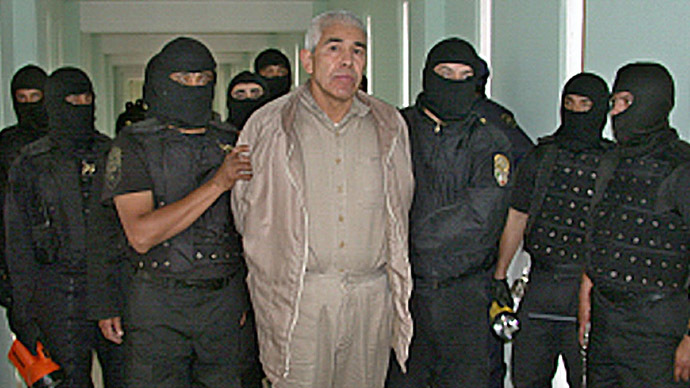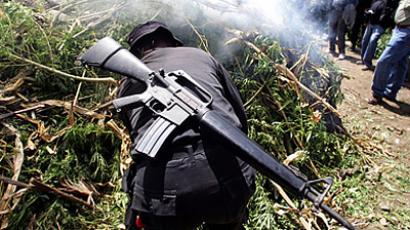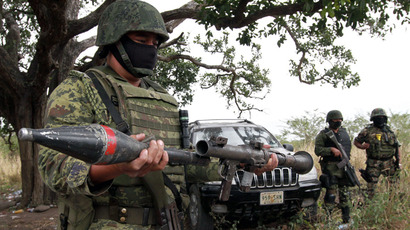US presses Mexico to arrest, extradite drug lord freed by 'powerful dark forces'

US law enforcement officials have officially asked the Mexican government to re-arrest a notorious drug lord who is wanted in the US for killing a federal officer, yet was released from a Mexican prison last week on a technicality.
Rafael Caro Quintero served 28 years of a 40 year sentence for the 1985 kidnapping, torture, and murder of Enrique “Kiki” Camarena, an undercover agent with the Drug Enforcement Administration (DEA). A three-judge panel in the western state of Jalisco overturned Quintero’s sentence on the basis that he should have initially been tried in a state, not federal court.
He was last seen early Friday morning leaving the prison on the outskirts of Guadalajara.
Quintero was one of the leaders of the powerful Guadalajara cartel, an early incarnation of the Sinaloa cartel now under the control of Joaquin “Shorty” Guzman, perhaps the most feared drug lord in Mexico. Quintero ordered Camarena’s torture and murder in retaliation for a series of successful drug busts. The narcotics agent was found alongside his Mexican driver in a shallow grave a month after he disappeared.
Mexican police failed to arrest Quintero before he escaped to Costa Rica, though, where he owned several luxurious real estate properties. He was apprehended in April 1985 while in possession of a diamond-encrusted firearm, two sports cars, and 300,000 dollars in cash.
The murder and ensuing search for Quintero is today seen as one of the lowest points in US/Mexican law enforcement cooperation.
Quintero remained one of the DEA’s most-wanted fugitives during his imprisonment and currently ranks within the agency’s top five. Authorities were adamant that Quintero was still involved with the cartel during his time behind bars.
“Caro Quintero has used a network of family members and front persons to invest his fortune into ostensibly legitimate companies and real estate projects in the city of Guadalajara,” Adam Szubin, the Director of the Treasury’s Office of Foreign Assets Control, previously stated.
Mexican Foreign Minister Jose Antonio Meade expressed outrage at the court’s sudden decision but, because the Mexican judicial branch is separate from the executive, it is unclear whether top leadership has the power to reverse the decision.
The Association of Former Federal Narcotics Agents in the US called the decision an “outrage” and implied corruption is responsible for Quintero’s new found freedom.
“The release of this violent butcher is but another example of how good faith efforts by the US to work with the Mexican government can be frustrated by those powerful dark forces that work in the shadows of the Mexican ‘justice’ system,” it said.
While it is far from clear how police will re-arrest a known drug trafficker equipped with a network of underground loyalists, the extradition process offers little to consolation. Mexican authorities have said they were unaware of any US extradition request pending when Quintero was released.
“Once the detention order against Rafael Caro Quintero is effected, the United States government will have 60 days to present its formal extradition request,” an official from the Mexican Attorney General’s office said.
A source from the Mexican Attorney General’s office told Reuters that Quintero would not be extradited to the United States because of a decision from the Mexican Supreme Court forbidding the extradition of Mexicans to countries that allow the death penalty or life imprisonment, two punishments forbidden under Mexican law.
US officials, however, have complained that they were offered no prior notice of Quintero’s release, with the Justice Department asserting that it “has continued to make clear to Mexican authorities the continued interest of the United States in securing Caro Quintero’s extradition so that he might face justice in the United States.”
Further, Quintero’s lawyer said he is now pursuing the release of Ernesto Fonseca Carrillo and Miguel Angel Felix, both of whom were convicted and jailed for helping plan Caramena’s kidnapping and murder.














